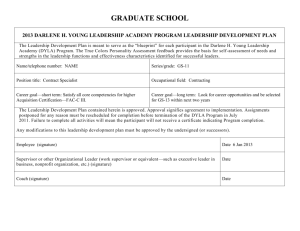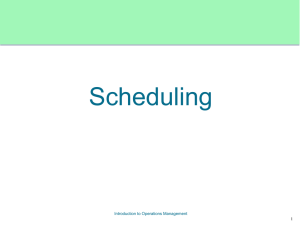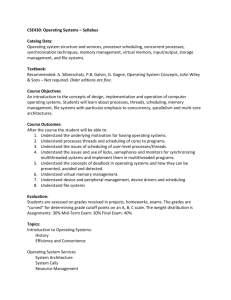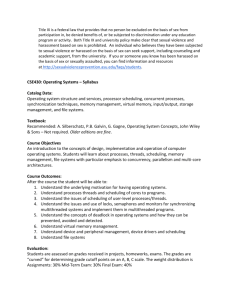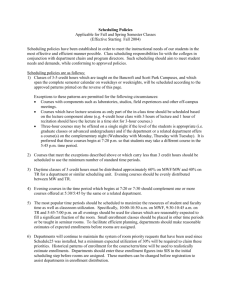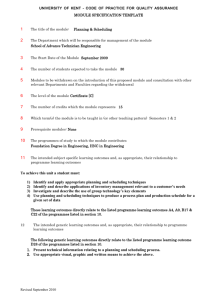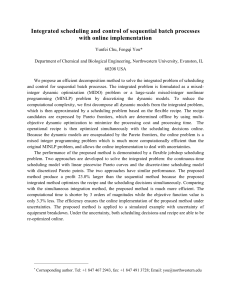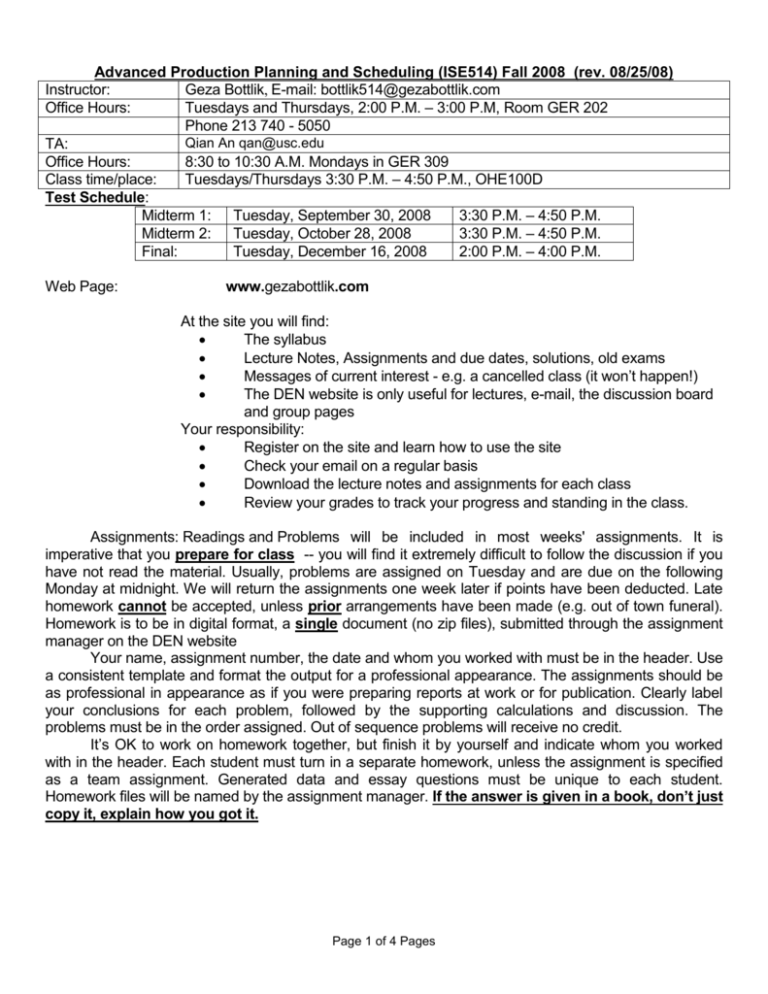
Advanced Production Planning and Scheduling (ISE514) Fall 2008 (rev. 08/25/08)
Geza Bottlik, E-mail: bottlik514@gezabottlik.com
Instructor:
Office Hours:
Tuesdays and Thursdays, 2:00 P.M. – 3:00 P.M, Room GER 202
Phone 213 740 - 5050
Qian An qan@usc.edu
TA:
Office Hours:
8:30 to 10:30 A.M. Mondays in GER 309
Class time/place:
Tuesdays/Thursdays 3:30 P.M. – 4:50 P.M., OHE100D
Test Schedule:
Midterm 1: Tuesday, September 30, 2008
3:30 P.M. – 4:50 P.M.
Midterm 2: Tuesday, October 28, 2008
3:30 P.M. – 4:50 P.M.
Final:
Tuesday, December 16, 2008
2:00 P.M. – 4:00 P.M.
Web Page:
www.gezabottlik.com
At the site you will find:
The syllabus
Lecture Notes, Assignments and due dates, solutions, old exams
Messages of current interest - e.g. a cancelled class (it won’t happen!)
The DEN website is only useful for lectures, e-mail, the discussion board
and group pages
Your responsibility:
Register on the site and learn how to use the site
Check your email on a regular basis
Download the lecture notes and assignments for each class
Review your grades to track your progress and standing in the class.
Assignments: Readings and Problems will be included in most weeks' assignments. It is
imperative that you prepare for class -- you will find it extremely difficult to follow the discussion if you
have not read the material. Usually, problems are assigned on Tuesday and are due on the following
Monday at midnight. We will return the assignments one week later if points have been deducted. Late
homework cannot be accepted, unless prior arrangements have been made (e.g. out of town funeral).
Homework is to be in digital format, a single document (no zip files), submitted through the assignment
manager on the DEN website
Your name, assignment number, the date and whom you worked with must be in the header. Use
a consistent template and format the output for a professional appearance. The assignments should be
as professional in appearance as if you were preparing reports at work or for publication. Clearly label
your conclusions for each problem, followed by the supporting calculations and discussion. The
problems must be in the order assigned. Out of sequence problems will receive no credit.
It’s OK to work on homework together, but finish it by yourself and indicate whom you worked
with in the header. Each student must turn in a separate homework, unless the assignment is specified
as a team assignment. Generated data and essay questions must be unique to each student.
Homework files will be named by the assignment manager. If the answer is given in a book, don’t just
copy it, explain how you got it.
Page 1 of 4 Pages
Advanced Production Planning and Scheduling (ISE514) Fall 2008 (rev. 08/25/08)
Objectives of the course
The major objective of this course is to have you understand the nature of a production or service
system – the intricate dependencies among long, intermediate and short range planning. The context of
these systems - organizational, behavioral and technological must also be understood. Finally, it is a
thorough understanding of the objectives, mathematical and applied methods and limitations of finite
scheduling.
Grading:
Project
Homework
Midterm 1
Midterm 2
Final exam
Participation (attendance, asking questions,
making contributions, postings on the
discussion board)
5%
25%
15%
20%
25%
10%
Participation for DEN students includes, e-mail, call in, and submitted questions and comments for the
lectures, postings on the discussion board and is expected every week. The grade for the course will
only be based on the required work listed above and cannot be improved with additional work. Note that
10% of the grade is for participation – so participate!
The required course reference materials consists of the following (Available from the book store as a
reader)
1. “Modeling techniques for automated production planning in the semiconductor industry”, Robert
C. Leachman from “Optimization in industry”, ed. By T. A. Ciriani and R.C. Leachman, John Wiley
and Sons, 1993
2. Chapters 1 and 2 of “Manufacturing Planning and Control Systems” by T.E. Vollman, W.L. Berry,
D.C. Whybark, 3rd Edition, Irwin 1992 ISBN: 025606167X
3. “Sequencing and Scheduling”, by S. French, Ellis Harwood, 1982 ISBN: 0470272295
4. “Scheduling: Theory, Algorithms, and Systems” , Michael Pinedo, Prentice Hall, 2nd Ed., 2002,
pages 211 -- 230 ISBN 0 – 13 – 028138 –7
5. “Industrial Scheduling”, by D.R. Sule, PWS Publishing Company, 1997, pages 81 – 111,
ISBN 0 – 534 – 95456 -1
6. “Introduction to sequencing and scheduling”, K.R. Baker, Wiley, 1974, pages 94 – end of chapter
ISBN: 0471045551
7. “Sequencing with earliness and tardiness penalties: a review, K.R. Baker and G.D. Scudder.
“Operations Research”, Jan/Feb 1990, pages 22 – 36
In addition there is a small text required that we will use throughout the semester:
“The fundamentals of production planning and control”, Stephen N. Chapman, Pearson Prentice Hall,
2006, ISBN 0-13-017615-X
Page 2 of 4 Pages
Advanced Production Planning and Scheduling (ISE514) Fall 2008 (rev. 08/25/08)
Course Outline:
08/26
09/02
09/09
09/16
Introduction and overview, Production planning (Week 1)
Production planning (2)
MRP (3)
Introduction to operations scheduling, definitions and performance measures, job
shop model and algorithms (4)
Mathematical methods: dynamic programming, branch and bound (6), Review
Midterm 1 (5)
Schedule generation, dispatching rules (7)
Heuristics, Searches (8)
Performance guaranties, Review (9)
Midterm 2 (10)
Early/Tardy Problems (11)
Project Scheduling (12)
Batch processing, sequence dependence (13)
Stochastic Problems (14)
Review, project due (15)
Final
09/23
09/30
10/07
10/14
10/21
10/28
11/04
11/11
11/18
11/25
12/02
12/16
References:
Silver, Pyke and Peterson, Inventory Management and Production Planning and Scheduling, 3rd
Ed. John Wiley, 1998
R.W. Conway, W.L. Maxwell and L.W. miller, Theory of scheduling, Addison Wesley, 1967
S. E. Dreyfus and A.M. Law, The art and theory of dynamic programming, Academic press 1977
F.S. Hillier and G. J. Lieberman, Introduction to Operation Research, McGraw-Hill, 1990
George W. Plossl, Orlicky’s Material Requirements Planning, Second Edition, McGraw-Hill, Inc.
1994
Michael Pinedo, Scheduling, Second Edition, Prentice Hall, 2002 ISBN – 0-13-028138-7
T.E. Morton and D.W. Pentico, Heuristic Scheduling Systems, Wiley, 1993
K. R. Baker, Elements of sequencing and scheduling, 2002 ISBN 0 – 9639746 – 1 – 0
D.R. Sule, Industrial Scheduling, PWS Publishing, 1997, ISBN – 0-534-95456-1
Recommended reading:
1.
Womack, J. P., Jones, D. T., and Roos, D. The machine that changed the
world, Rawson Associates, NY, 1990
2.
Goldratt, E.M., The Haystack syndrome, North River Press, NY, 1990
Page 3 of 4 Pages
Advanced Production Planning and Scheduling (ISE514) Fall 2008 (rev. 08/25/08)
ALWAYS BE SURE TO GIVE THE SOURCE OF ALL YOUR INFORMATION. ANYTHING
TAKEN VERBATIM FROM SOMEONE ELSE MUST BE IN QUOTATION MARKS AND
REFERENCED. THIS INCLUDES PARTIAL SENTENCES.
This is intended to be an interactive class and your participation should increase as the semester
progresses. Attendance at all classes is expected of everyone. Frequent absences will result in a
reduction in grade. Punctuality is expected. If you are late, be sure not to disturb the class as you enter.
PLEASE DO NOT BRING FOOD OR DRINKS TO THE CLASS. (Water in plastic bottles is OK)
The midterm and final will be based on problems similar to the ones assigned in the homework and the
discussions in class. All tests are open book and open notes. Laptops are also allowed. Students
are expected to apply what they should have learned up to that point to analyzing situations, identifying
the problems and applying the appropriate techniques to solve them.
NEATNESS, SPELLING, AND GRAMMAR COUNT. THEY ARE AN EXPRESSION OF YOUR
COMMITMENT TO DO A GOOD JOB.
Last, but most important:
The School of Engineering and the Department of Industrial and Systems Engineering adhere to
the University’s policies and procedures governing academic integrity as described in Scampus.
Students are expected to be aware of and observe the academic integrity standards described in
Scampus. I will enforce these standards -- in other words, if you cheat and get caught you will get an F
in the class.
Any Student requesting academic accommodations based on a disability is required to register
with Disability Services and Programs (DSP) each semester. A letter of verification for approved
accommodations can be obtained from DSP. Please be sure the letter is delivered to me (or to TA) as
early in the semester as possible. DSP is located in STU 301 and is open 8:30 a.m. - 5:00 p.m., Monday
through Friday. The phone number for DSP is (213) 740-0776.
Page 4 of 4 Pages


